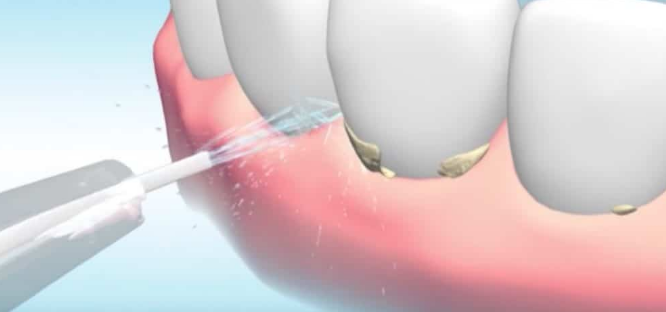6 Reasons To Have An Oral Irrigator At Home
 Oral irrigators are devices that spray high-pressure water to clean hard-to-reach areas in your mouth.
Oral irrigators are devices that spray high-pressure water to clean hard-to-reach areas in your mouth.
They remove food debris and plaque from your teeth and gum, preventing oral conditions such as cavities and gum disease.
Many studies have proven their effectiveness, and millions of them are sold monthly.
For some people, they can be a good alternative to traditional flossing.
Discover 5 reasons to invest in an oral irrigator.
1- You have a sensitive gum
People with sensitive gums may find flossing irritating. Some who suffer from gum disease even report bleeding.The discomfort makes oral hygiene measures difficult, yet essential to reverse the early stage of gum disease.
The oral irrigator, in this case, is an excellent alternative.
In addition to removing trapped plaque and food debris, it stimulates blood flow to the gums, increasing their resistance to bacteria.
A study has shown that using an oral irrigator besides tooth brushing reduces inflammation and gum bleeding better than traditional flossing. It also prevents the recurrence of gum disease after periodontal treatment.
2- You wear a dental appliance such as a bridge, an implant, or braces
Teeth that support braces are more susceptible to cavities and gum disease. Plaque accumulation is important in these areas. Brushing alone is not sufficient. An additional oral hygiene tool is then necessary.The oral irrigator reaches those areas that brushing or flossing alone cannot clean. It removes accumulated food and plaque before they turn into tartar.
3- You have tight or crowded teeth
An oral irrigator can be a good alternative if you have tight or crowded teeth. The force of the liquid sent under pressure allows you to clean the spaces between your teeth, completing the action of tooth brushing.4- After a dental extraction or oral surgery
After oral surgery, strict oral hygiene is essential to prevent infection and ensure optimal healing. During the healing period, brushing and flossing can be uncomfortable. In addition, the mechanical action of brushing can damage the wound and interfere with healing.The oral irrigator helps reduce the discomfort while ensuring optimal cleaning. The use of an antibacterial concentrate diluted in water may give better results.
5- Getting rid of bad breath
Halitosis or bad breath is the result of the accumulation of bacteria capable of producing bad odors. Its treatment consists in eliminating the cause.If you don't already use more tools for tooth brushing, consider introducing them into your oral hygiene routine. Among them are dental floss, interdental brushes, oral irrigators, and mouthwashes.
The tongue contains a significant quantity of bacteria responsible for halitosis. Cleaning this area with a tongue scraper is also important to prevent bad breath.
If halitosis persists, even after you have improved your oral hygiene, talk to your dentist to identify the cause and the appropriate treatment.
6- All family members can use it, including children
Another advantage of the oral irrigator is that it can be used even by children.It allows them to complete the action of tooth brushing, which is still clumsy at their age.
Thanks to its playful side, children would have fun using it. The oral irrigator is a good way to motivate and teach children the basics of good oral hygiene.
- Costa, F. O., Costa, A. A., & Cota, L. O. M. (2020). The use of interdental brushes or oral irrigators as adjuvants to conventional oral hygiene associated with recurrence of periodontitis in periodontal maintenance therapy: A 6-year prospective study. Journal of Periodontology, 91, 26– 36.
- Barnes CM, Russell CM, Reinhardt RA, Payne JB, Lyle DM. Comparison of irrigation to floss as an adjunct to tooth brushing: effect on bleeding, gingivitis, and supragingival plaque. The Journal of Clinical Dentistry 2005;16(3):71‐7.